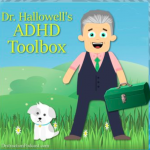Most people who discover they have Attention Deficit Hyperactivity Disorder (ADHD,) whether they be children or adults, have suffered a great deal of pain. The emotional experience of ADHD is filled with embarrassment, humiliation, and self-castigation. By the time the diagnosis is made, many people with ADHD have lost confidence in themselves. Many have consulted with numerous specialists, only to find no real help. As a result, many have lost hope. So the most important step at the beginning of treatment is to instill hope once again.
Individuals with ADHD may have forgotten what is good about themselves. They may have lost, long ago, any sense of the possibility of things working out. They are often locked in a kind of tenacious holding pattern, bringing all theory, considerable resiliency, and ingenuity just to keeping their heads above water. It is a tragic loss, the giving up on life too soon. But many people with ADHD have seen no other way than repeated failures. To hope, for them, is only to risk getting knocked down once more.
And yet, their capacity to hope and to dream is immense. More than most people, individuals with ADHD have visionary imaginations. They:
- think big thoughts and dream big dreams;
- can take the smallest opportunity and imagine turning it into a major break;
- take a chance encounter and turn it into a grand evening out; and,
- thrive on dreams
But like most dreamers, they go limp when the dream collapses. Usually, by the time the diagnosis of ADHD has been made, this collapse has happened often enough to leave them wary of hoping again. The little child would rather stay silent than risk being taunted once again. The adult would rather keep his mouth shut than risk flubbing things up once more. The treatment, then, must begin with hope.
Hope is at Hallowell
 Come to one of my Hallowell Centers and let us introduce you to my strength-based approach. It begins with a personal connection with you—and your family if appropriate—and one of our clinicians. We believe in the power of positive connection above all else. Together we turn what you may have thought was a “deficit disorder” into an advantage full of powers that can’t be bought or taught. We open up what you’ve known all along was a treasure chest, but you just didn’t know how to open.
Come to one of my Hallowell Centers and let us introduce you to my strength-based approach. It begins with a personal connection with you—and your family if appropriate—and one of our clinicians. We believe in the power of positive connection above all else. Together we turn what you may have thought was a “deficit disorder” into an advantage full of powers that can’t be bought or taught. We open up what you’ve known all along was a treasure chest, but you just didn’t know how to open.
Tips on Managing ADHD
 I have ADHD and I understand the struggles associated with ADHD. I know it can take a variety of strategies and tools to manage ADHD symptoms. (And they might not always work.) In this Distraction episode, I share a few quick insights about how I manage my own ADHD on a daily basis. One of my tools is self-acceptance. It took me awhile to get there, but now I accept who I am.
I have ADHD and I understand the struggles associated with ADHD. I know it can take a variety of strategies and tools to manage ADHD symptoms. (And they might not always work.) In this Distraction episode, I share a few quick insights about how I manage my own ADHD on a daily basis. One of my tools is self-acceptance. It took me awhile to get there, but now I accept who I am. 





